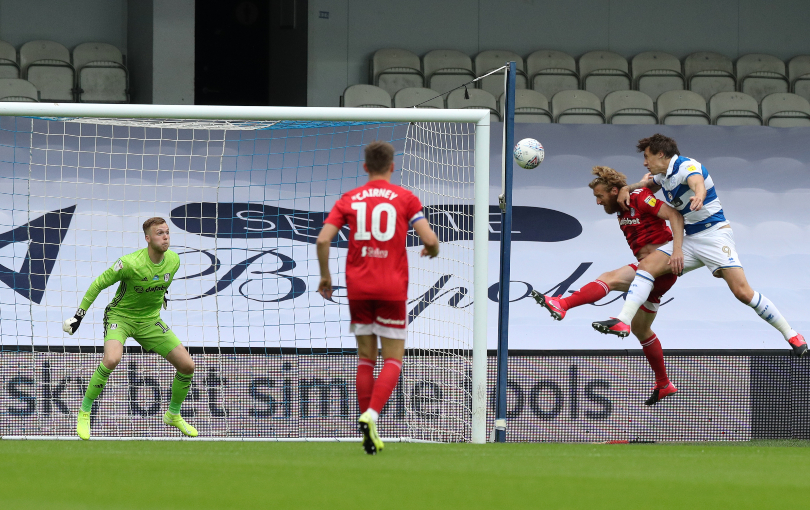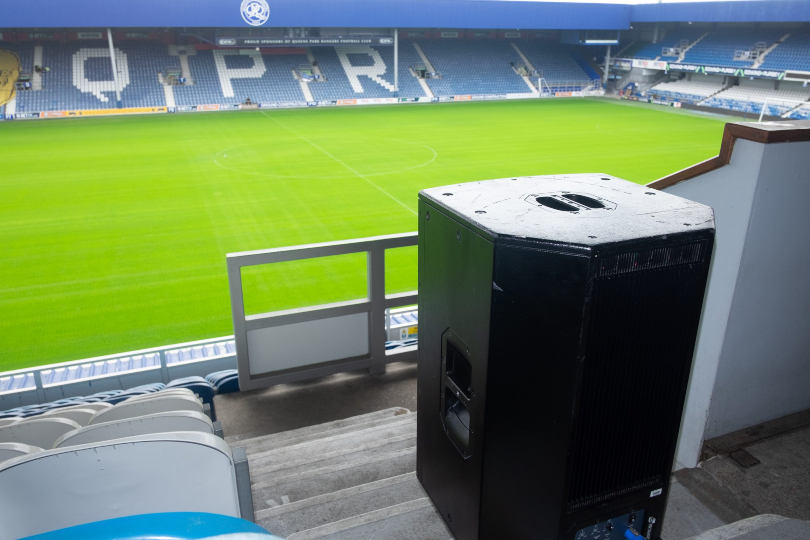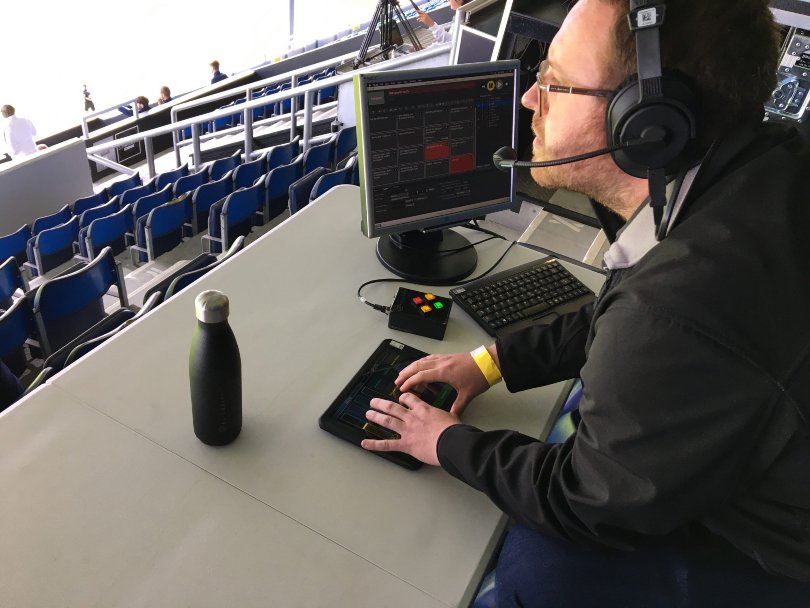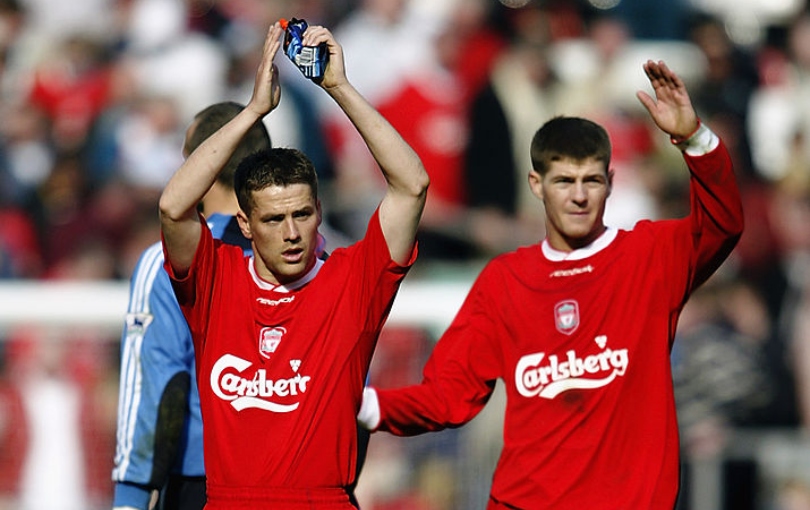Who controls the fake crowd noise? How clubs are experimenting with match atmosphere in empty stadiums
How do you make a game being played behind closed doors feel like it is in a sold-out stadium? FFT spoke to the people in charge of pumping in the crowd noise

As Ryan Manning‘s header crashed against Marek Rodák‘s crossbar in the 88th minute of the west London derby between QPR and Fulham the roar from the behind the goal got louder.
With QPR trailing 2-1 and pushing for an equaliser against their near-neighbours, the noise from the far end of the ground was getting louder and louder as the sense of a goal intensified.
Anyone wandering around the tightly packed streets of Shepherd's Bush on that late June evening would have heard the chants and roars coming from the 116-year-old ground and could have been forgiven for thinking that lockdown had been lifted and fans had returned to football.
Then Dominic Ball’s shot from inside a crowded box was blocked before Manning saw another header miss the target as QPR were roared on right to the final whistle – albeit in vain.
🔊 Sound ON!Meet the team bringing @TheKPF Stadium to life behind closed doors.👏 @AutographLondon pic.twitter.com/An24VR3J1mJune 30, 2020
Only lockdown had not been lifted and this game was played behind closed doors and there were no fans – just a handful of stewards – behind the goal in the Loft End or anywhere else in the stadium for that matter.
So how did a west London derby played in front of 300-odd staff, stewards, medical professionals and media feel like it was being watched by 16,500 fans packed into the Kiyan Prince Foundation Stadium?
It was all thanks to the clever work of a theatre sound company, Autograph, who brought their 40 plus years of experience of working in West End to a small corner of west London.
Get FourFourTwo Newsletter
The best features, fun and footballing quizzes, straight to your inbox every week.
When the football emerged from its enforced three-month hibernation there were many changes – none more noticeable than games being played behind closed doors. Social distancing rules have meant that no fans have attended any games in England since early-March and that has created a few issues in how to replicate the matchday buzz of playing in front of stands full of fans.
While Premier League games are played in the eerie quiet of the near-empty stadiums with crowd noise added in by broadcasters – and provided by FIFA video game manufacturers EA – Championship clubs were given the option to pump crowd noise into their stadiums.
Middlesbrough, Luton and Charlton are among a number of Championship clubs who opted to do this in-house via their stadium’s PA systems, while Fulham and Wigan are just two of the clubs who have decided to not add crowd noise at their home games.
And while noise pumped out over a PA system works to some extent, it does not truly represent the tens of thousands of fans that would be in the stadium on a normal match day.
But QPR have tried to do things a little differently, and make the in-ground experience as realistic as possible for the players and those watching on the club’s in-house streaming service.

They have enlisted the help of Autograph, whose normal business came to a halt overnight in March, they switched their attention from the stalls to the stands to see if they could use their theatre skills to help make football in lockdown feel as realistic as possible.
Autograph’s hire manager Will McGonagle – a QPR fan – explains how the idea was hatched while watching the early German games on television.
He said: “It started off as a chat on WhatsApp between a few of us, then when we saw the Bundesliga and then we started to think that it could be more and could be some serious work.
“There are some people who are not fans of fake crowd noise and never will be, and that’s fine. But I think once we are able to show off what we can do then people will be more in favour of it.”
😔 We may not be able to see you.But we'll still be able to hear you 🔊#QPR pic.twitter.com/6XXiCC8zbJJune 19, 2020
They teamed up with Fan Chants – a company that boasts a library of over 26,000 of real crowd chants from around the world taken from past matches – and production company Entourage and created a realistic 360-degree stadium experience.
McGonagle added: “The way we work with QPR is we have 12 different zones around the stadium all with large speakers in them. What that enables us to do is to have different reactions come from different parts of the ground - as they would if fans were in the ground.
“One of the main chants at QPR is ‘Come on you R’s’ and that starts off in the R Block of the Ellerslie Road Stand. So we are able to start the chant off there and then spread it around the ground, making it feel as realistic as possible.

“We are only working with the home teams at the moment, but if we were approaching in from a neutral point of view, then the zones would allow us to have chants for the away team and for them only to come from The School End.
“The key is trying to recreate the sounds of the crowd and where the noise comes from in as realistic way as possible.”
And it works. When sitting in the stadium and focusing on the game and listening to the crowd noise it is possible to forget a game is being played in an empty stadium.
In QPR’s defeat by Fulham, when the home side were pushing for an equaliser in the final ten minutes, the noise from behind the Loft End became noticeably louder - as it would have done if the game had had the fans in the ground.
The 12 zones in the ground are controlled by three sound engineers with iPads who ensure the noises react to the game in as realistic a way as possible. If a winger beats two defenders on one side of the pitch, then that sound of the ground will react. If the team have three corners in a row then the end behind that goal will get louder.
Contrast that to a few days later when Fulham beat Birmingham in a near-silent Craven Cottage where the loudest noises were the players shouting at each other and the members of the Birmingham backroom team sitting in the stands contesting every decision made by referee Keith Stroud.
McGonagle added: “Watching the Premier League on TV, the crowd noise helps. But I don’t want to be too derogatory, it has been pretty generic.
“It all seems to be on one level. I have seen players injured and the sound is at the same level when in reality the sound would have gone down to a hushed silence. With us, we are trying to control the 15,000 fans that would normally be in the ground.

“Some of the Championship clubs are doing crowd noise in-house, but I don’t think they are doing it with the same level of reaction that we are. We approached it initially to try and give the home team a bit of an advantage, we have cut out all the chants that are offensive, or not constructive. It is about being as positive as possible.
“We also want to try and make it as real as possible when QPR are attacking, so if there are two or three corners in a row, then the crowd are urging it on and getting louder, so that is what we have tried to recreate.”
If social distancing rules remain in place when the new season is expected to begin in September then it will kick off behind closed doors and more clubs might look to the likes of Autograph to help recreate the match day feeling for players in the stadiums.
Admittedly for QPR, the realistic sounds coming from the stands have not yet spurred the side onto victory at home, with defeats to Barnsley, Fulham and Sheffield Wednesday since a return form lockdown is miserable reading for the R’s fans watching from afar.
But the club are positive about the impact that the Autograph set up has had more generally on games.
Joshua Scott, Head of Operations at QPR, said: “The reaction from the players and coaches has been very positive and they certainly notice a difference compared to away fixtures that we’ve played so far.
“Our plan was to try and make the players feel comfortable psychologically and having an empty stadium where noise bounces around feels very out of the ordinary, while we can’t have fans back in it was agreed that this made the stadium feel more ‘normal’.

“You can see the vast difference between the Autograph system and other stadia whereby they are able to produce noise in specific areas of the ground alongside a large library of songs and chants – compared to other grounds where the same few songs were repeated over and over.
“The main issue with playing crowd songs through a PA system is that it is difficult to replicate the ambient noise of a crowd in place where you normally have 10-15,000 people speaking to each other, which Autograph have been able to replicate to provide a more lifelike experience.”
And Autograph’s set up knows no bounds, it can work in an 18,500 capacity stadium like the Kiyan Prince Foundation Stadium, but could be scaled up for a 90,000 ground like Wembley for the Championship play-off final - should the EFL look to make their season showpiece as realistic as possible.
And looking ahead to next season more clubs could look to do what QPR have done by looking to Autograph to help create a realistic atmosphere, although McGonagle hopes this new venture comes to an end over night, fans are allowed back in grounds and he and his colleagues can go back to working in the West End.
He said: “All being well we can go back to doing theatres and events and fans can return to grounds. However, there is a middle ground with some matches possibly having limited crowds next season. We are looking at how can we help enhance the sparse crowd that is there.”
Football without fans may not be what anyone wants, but for the time being this is one of the better alternatives.
While you’re here, why not subscribe to the mag - just £9.99 for the first six months, over £38 cheaper than buying it in the shops!
NOW READ...
ANALYSIS 5 implications of Manchester City's Champions League ban being lifted
NEW PREMIER LEAGUE KITS 2020/21 Every released home and away shirt so far
GUIDE Premier League live stream best VPN: how to watch every game from anywhere in the world

James Andrew is the editor of FourFourTwo, overseeing both the magazine and website. James is an NCTJ qualified journalist and began his career as a news reporter in regional newspapers in 2006 before moving into sport a year later. In 2011 he started a six year stint on the sports desk at the Daily Mail and MailOnline. James was appointed editor of FourFourTwo in December 2019. Across his career James has interviewed the likes of Franco Baresi, Sir Alex Ferguson, David Beckham and Michael Owen. James has been a Fulham season ticket holder since the mid-1990s and enjoys watching them home and away, through promotion and relegation.
